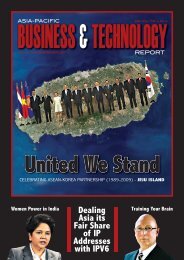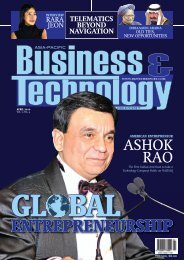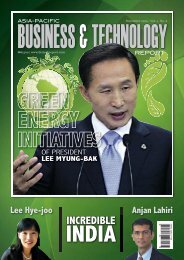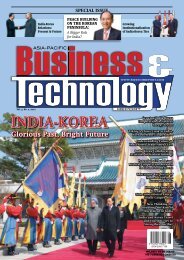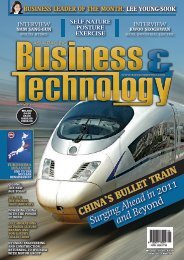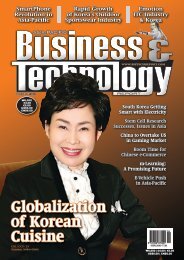GreeN Growth - Asia-Pacific Business and Technology Report
GreeN Growth - Asia-Pacific Business and Technology Report
GreeN Growth - Asia-Pacific Business and Technology Report
- No tags were found...
Create successful ePaper yourself
Turn your PDF publications into a flip-book with our unique Google optimized e-Paper software.
usinesswww.biztechreport.comS. Korean Financial Leaders DeflectOECD Criticism of Rising InequitiesBy Donald KirkAtough report issuedby the Paris-basedOrganization forEconomic Cooperation <strong>and</strong>Development portrays thedownside of modern SouthKorea, despite the “miracle”of the rise from the ashes ofthe Korean War that ragedsome 60 years ago.Against the image of Korea as a newlyshininggiant spewing forth cars, computers,ships, <strong>and</strong> chips for global consumption,the OECD opened its annual reviewof the country with the pointblank declaration:“Korea is confronting a serious challenge.”What, in the view of the OECD, does Koreanow have to do to respond effectively?First <strong>and</strong> foremost, it must “improve incomeequality in the context of a severe demographictransition” – that of “transitionfrom one of the youngest populations inthe OECD at present to the second oldest by2050.” That attenuated process, the reportwarned, “may boost the need for publicspending <strong>and</strong> slow economic growth.” Butthe problem goes much deeper than that,according to the report. “Sustained rapidgrowth during the first decade of the 21stcentury has been accompanied by a markedrise in income inequality,” it noted. “Underlyingsocial problems were further exacerbatedby the 2008 global economic <strong>and</strong> financialcrisis.”Even “as Korea integrates into the globaleconomy, said the OECD study, “it facesmany of the same forces that have led to risinginequality in other OECD countries. “Inthe Korean case, however, the problem isactually worse than in most member states.“First, its level of social spending is amongthe lowest in the OECD area,” said the report.“Second, the impact of its tax <strong>and</strong>transfer systems on income distribution<strong>and</strong> poverty is among the weakest. Third,Korea’s dualistic labour market is highlysegmented between regular <strong>and</strong> non-regularworkers, leading to wide inequality inwage income.”The OECD report offered starkly-realisticrecommendations that Korean politicians<strong>and</strong> bureaucrats do not appear in any hurryto accept: “As the pace of population agingis accelerating, it is important to act quicklyin a wide range of areas.” These include:• “Policies to sustain Korea’s growthpotential in the face of falling laborinputs;• “Measures that improve both growth<strong>and</strong> equality;• “Carefully-targeted increases in socialspending to reduce inequality<strong>and</strong> poverty;• “Financing higher social spending,with priority given to a reform oftax <strong>and</strong> social security that minimizesthe negative impact on outputgrowth.”The chances of Korea’s digesting such amenu appear remote given the emphasis ofthe conservative government on welfare –not social welfare but that of the chaebol,the conglomerates that dominate business<strong>and</strong> industry. Korean bureaucrats preferto dwell on the country’s recovery fromthe economic crisis that swept the worldin 2008 – a “downturn” from which theworld’s economic leader, the United States,is far from recovering.“Korea has recovered from the global financialturmoil triggered by the sub-primemortgage crisis faster than other OECDcountries thanks to its rapid <strong>and</strong> decisivepolicy responses,” said Kim Dong-soo, chairmanof South Korea’s Fair Trade Commission,the day after the OECD issued its report.“The Korean economy posted positivegrowth (2.9 percent) in 2009 when majoradvanced economies were contracting.”Then, in 2010, Kim Dong-soo told a meetingin Seoul of the American Chamber of Commercethat the Korean economy “grew byas much as 6.2 percent, the highest growthover the last eight years.”No less an economic analyst, adviser <strong>and</strong>policy-maker than the International MonetaryFund “commended Korea for its exemplaryperformance in recovery from thecrisis,” Kim observed. Moody’s accorded Koreathe ultimate badge of honor by raisingKorea’s national credit rating from A2 to A1in April 2010, he said, while the World Bankforecast in May that six countries, Korea, Indonesia,<strong>and</strong> the BRICs, (Brazil, Russia, India<strong>and</strong> China) “would account for more thanhalf of the world’s economic growth for thenext 20 years.”After all that success, then, what couldbe going wrong? Kim preferred to lay theblame on popular opinion rather thangovernment policies. “The problem is thatthe general sentiment on the economy isnot improving in Korea,” he said, “despitestrong signs of recovery from these macroeconomicindicators.” Besides “inflationarypressure in the Korean economy,” he acknowledgedthat “large companies’ undueinfluence over small <strong>and</strong> medium-sizedenterprises (SMEs), collusion practices, institutional<strong>and</strong> structural factors” <strong>and</strong> “thecreation of monopoly <strong>and</strong> long-sustainedmonopolistic market structures” were all“aggravating the current conditions.”Kim addressed the issue of reforms, however,in vague terms that suggested few realpossibilities for reversing a trend in whichthe power of the chaebol has been smotheringcompetition from upstart rivals. TheFair Trade Commission “is implementingcompetition policies,” he said, that would:• “Create an open market where entryor exit of the market occurs freely;• “Uncover <strong>and</strong> correct illegal practicesof companies that harm the principlesof a market economy;• “Ensure shared growth betweenlarge companies <strong>and</strong> SMEs by inducingthem to change their corporateculture voluntarily;• “Create an environment where consumersserve as competitive pressure.”Kim Dong-soo spoke of “the ultimategoal” in verbiage that resembled that of apastor inveighing against sin. The key, hesaid, was “to spread competitive principlesacross the economy, building more transparent<strong>and</strong> sound economic systems, therebykeeping the national economy stable.”He predicated those fine words on PresidentLee Myung-bak’s “three values” for a“fair society,” that is, “autonomy, fairness<strong>and</strong> responsibility.” Considering Lee’s backgroundas top executive of Hyundai Engineering<strong>and</strong> Construction <strong>and</strong> his supportof exp<strong>and</strong>ing the chaebol while paying lipservice to the SMEs, one had difficulty viewingsuch “values” as anything other thanwindow-dressing.Kim himself recognized the problemfrom his years as president of the KoreaExIm Bank. “Unfortunately these experienceshave brought me to the conclusionthat mutual partnership between large <strong>and</strong>small companies has yet to take root in Korea,”he said. Kim, however, was not in favorof rules <strong>and</strong> regulations that might bringabout change. “Companies need to improvetheir culture <strong>and</strong> attitude through their voluntaryeffort,” he made clear, “rather thanbeing forced by laws or regulations.”Bahk Jaewan, minister of strategy <strong>and</strong>finance, answered concerns about incomeinequities <strong>and</strong> the power of the chaebol inremarks that left open the question of exactlywhat the government would really do.“The government will finely tune up socialsafety nets <strong>and</strong> encourage shared growth,”he declaimed in a speech at the Seoul ForeignCorrespondents’ Club after the issuanceof the OECD report. No way, however,could people expect h<strong>and</strong>outs. “The government’swelfare policy,” he said, “is aimed atencouraging recipients to work rather thanrelying on welfare benefits.”On the sensitive issue of what to do aboutSMEs, Bahk promised that the governmentwould “encourage shared growth by largecompanies <strong>and</strong> SMEs while enhancing faircompetition by closely monitoring unfairbacking practices between affiliates.” Yes,he vowed, “We plan to prevent large conglomeratesfrom gaining unfair benefitsthrough trades with their own affiliate orsubsidiary companies.” But what would thegovernment really do? Cooperation on thepart of business would be “voluntary,” hesaid, spurning the idea of new “rules <strong>and</strong>regulations.” Bahk acknowledged, however,that the government under PresidentLee had done away with “regulations” thatwere only impeding business growth. Heargued that Korea was actually doing morethan most other countries to close the gap.“Through deregulation <strong>and</strong> tax cuts the governmentwill enhance economic freedom,”he said, “<strong>and</strong> reduce government influenceto revitalize private sector activities.”That laissez-faire view provided a rationalethat would only contribute to the repressionof SMEs <strong>and</strong> deepen inequities tocure the ills that Bahk claimed to want toaddress. The Korean position also defiedthe recommendations of the OECD, whichKorea joined 15 years ago in a great showof national pride over acceptance into oneof the global economy’s most elite clubs.The OECD placed top priority on increasingthe efficiency of labor in a system in whichhours are long but productivity in the servicesector is half that of the manufacturingsector <strong>and</strong> 40 percent of the service sectorin the United States. “Faster labor productivityin services requires strengtheningcompetition through regulatory reform,”said the OECD report.The OECD report called for “greateropenness to the world economy as one wayto boost productivity in an inward-lookingsociety in which foreign direct investmentas a percentage of the gross domestic productis the second lowest in the OECD area.”Foreign affiliates, it said, account for only 8percent of service-sector turnover <strong>and</strong> fourpercent of employment, “well below OECDaverages of 19 <strong>and</strong> 10 percent.” The reportadvised “strengthening internationalcompetition” by “reducing barriers to FDI,Continued on Page 39By Rashmi GuptaSouth Korea continuesin its position asfourth-largest economyin <strong>Asia</strong> with a 1.3percent growth in GrossDomestic Product.However, although early estimates inApril showed 1.4 percent growth, theBank of Korea affirmed in the first weekof June that the first quarter GDP growthstood at 1.3 percent.In fact, it was noted that South Korea’seconomy grew at this pace during Januaryto March largely to spurt of growth inthe manufacturing sector. Yet there weresignificant figures pointing to a slowdownin domestic dem<strong>and</strong>.Sebastian Czapnik | Dreamstime.comSouth Korean <strong>Growth</strong> RateRevised Downward, Following1st Quarter <strong>Growth</strong>Bank of Korea EstimatesThe Bank of Korea stated that theslower pace of growth was largely due toweaker domestic dem<strong>and</strong> combined withvery slow facility investment, althoughexports were robust.“Despite weakness in capital <strong>and</strong> constructioninvestments, robust exports ledthe overall growth in the first quarter,”said bank officials. Although goods goingout of the country remained at a steadypace, especially in the semiconductor<strong>and</strong> automobile industries, lesser spendingby consumers <strong>and</strong> investment in facilitiesaffected overall economic performancerates.Construction investment fell off as thegovernment was concentrating more onsocial infrastructure, while tech sectorinvestment delays led to slower spendingthere.Jung Young-taek, director of the BOK(Accounts Division) says that, “If investmentin social infrastructure revives, thedomestic dem<strong>and</strong> is likely to pick up.”Key Rates to StagnateIt is expected that the central bankwill freeze the key rate to 3 percent forthis month too, as there appears to begreater uncertainty brewing. Some of theleading economic experts, such as ParkSang-hyun at HI Investment & SecuritiesCo., believe that “With poor industrialoutput in April <strong>and</strong> slow recovery paceof domestic dem<strong>and</strong>, it is likely that thesecond-quarter economic growth maycool to below 1 percent.”In fact, inflation risks are peaking asconsumer prices rose beyond the Bank ofKorea’s guidelines of 2 to 4 percent forthe fifth month in a row in May. In comparisonto the previous year, inflationslowed to 4.1 percent in May from 4.2percent the previous month. However,key prices excluding the expansive oil<strong>and</strong> food prices were higher, at 3.4 percentfrom the previous year.However, the most important contributorto South Korea’s GDP, its exports,grew by 4.6 percent by quarter in the firstquarter, exceeding estimations of 3.3 percentgrowth.Gross National IncomeDeclines by 0.1 PercentThe GNI reflects the actual purchasingpower of a nation, <strong>and</strong> the present GNIfor the first quarter is at 0.1 percent lowerthan the previous quarter. This was thefirst recognized fall in over two years.Recommendations by KoreaDevelopment Institute or KDIKDI predicts that “2011 inflation willrise to 4.1 percent instead of the former3.2 percent estimate,” <strong>and</strong> suggests thatthe Bank of Korea should lift its key ratedespite the perceived inflation risks. A-P32 | A-P BUSINESS & TECHNOLOGY REPORT A-P BUSINESS & TECHNOLOGY REPORT | 33



